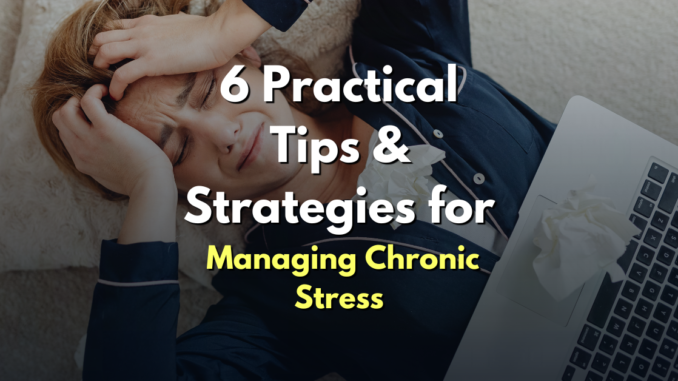
Chronic stress can take a significant toll on your physical and mental health. It’s essential to adopt effective strategies to manage and reduce its impact on our life. Here are some practical techniques to help you manage chronic stress and maintain a healthier, more balanced life:
1. Identify Stressors
Awareness: The first step in managing stress is identifying what triggers it. Keep a stress journal to track situations that cause stress, how you respond, and what helps you feel better.
Patterns: Look for patterns in your stressors. Are there specific times of day, activities, or people that consistently cause you stress?
2. Practice Mindfulness and Meditation
Mindfulness: Mindfulness involves staying present and fully engaging in the moment. Regular mindfulness practice can reduce stress and improve emotional regulation.
Meditation: Set aside time each day for meditation. Even a few minutes of deep breathing or guided meditation can significantly reduce stress levels.

3. Exercise Regularly
Physical Activity: Regular exercise is a powerful stress reliever. Aim for at least 30 minutes of moderate exercise most days of the week. Activities like walking, jogging, yoga, and swimming are great options.
Endorphins: Exercise boosts the production of endorphins, the body’s natural stress relievers, improving your mood and overall well-being.
Follow the Dnyan Power: Inspired Life channel on WhatsApp to get regular updates and read insightful articles everyday!
4. Maintain a Healthy Lifestyle
Nutrition: Eat a balanced diet rich in fruits, vegetables, whole grains, and lean proteins. Avoid excessive caffeine, sugar, and processed foods, which can contribute to stress.
Sleep: Prioritize getting enough sleep. Aim for 7-9 hours per night to help your body and mind recover from daily stressors.
5. Develop Healthy Coping Mechanisms
Hobbies: Engage in activities you enjoy and find relaxing. Hobbies like reading, painting, gardening, or playing a musical instrument can provide a mental escape from stress.
Social Support: Reach out to friends, family, or support groups. Talking about your stressors with someone you trust can provide relief and new perspectives.
6. Manage Your Time Effectively
Prioritize: Make a list of tasks and prioritize them. Focus on completing high-priority tasks first and break larger tasks into smaller, manageable steps.
Time Management: Use tools like planners or apps to organize your day. Allocate specific time blocks for work, relaxation, and self-care.
7. Set Boundaries
Say No: Learn to say no to additional responsibilities or commitments that can increase your stress levels. It’s okay to protect your time and energy.
Work-Life Balance: Establish clear boundaries between work and personal life. Ensure you allocate time for relaxation and activities you enjoy outside of work.
8. Practice Relaxation Techniques
Deep Breathing: Practice deep breathing exercises to activate your body’s relaxation response. Inhale deeply through your nose, hold for a few seconds, and exhale slowly through your mouth.
Progressive Muscle Relaxation: This involves tensing and then slowly releasing different muscle groups in your body, promoting physical relaxation.
9. Seek Professional Help
Therapy: If chronic stress is overwhelming, consider seeking help from a therapist or counselor. Cognitive-behavioral therapy (CBT) and other therapeutic approaches can be highly effective in managing stress.
Stress Management Programs: Look for stress management programs or workshops in your community or online. These programs can provide additional tools and support.
6 Practical Tips for Daily Stress Management
1. Start Your Day with a Routine
Morning Routine: Create a calming morning routine that sets a positive tone for the day. This might include stretching, meditation, a healthy breakfast, and planning your day.
2. Take Breaks Throughout the Day
Regular Breaks: Schedule short breaks during your workday to rest and recharge. Step away from your desk, take a walk, or practice a quick relaxation exercise.
3. Practice Gratitude
Gratitude Journal: Keep a gratitude journal and write down things you are thankful for each day. Focusing on positive aspects of your life can shift your mindset and reduce stress.
4. Limit Exposure to Stressors
Media Consumption: Be mindful of your media consumption. Limit exposure to news and social media if they contribute to your stress. Set specific times to check updates rather than constantly monitoring them.
5. Stay Hydrated
Drink Water: Dehydration can exacerbate stress. Ensure you drink plenty of water throughout the day to stay hydrated and support your body’s stress response.

6. Create a Relaxing Evening Routine
Wind Down: Develop an evening routine that helps you unwind before bed. This might include reading, taking a warm bath, or listening to calming music.
Managing chronic stress is an ongoing process that requires consistent effort and self-care. By implementing these strategies, you can better navigate the challenges of daily life and maintain a healthier, more balanced lifestyle. Stay calm and take care of yourself!
FAQ: Managing Chronic Stress
Q: What is the first step in managing stress?
A: The first step is identifying what triggers your stress. Keep a stress journal to track situations, your responses, and what helps you feel better.
Q: How can mindfulness and meditation help with stress?
A: Mindfulness involves staying present and fully engaging in the moment, while meditation involves setting aside time each day for deep breathing or guided meditation. Both practices can reduce stress and improve emotional regulation.
Q: How can I maintain a healthy lifestyle to manage stress?
A: Eat a balanced diet rich in fruits, vegetables, whole grains, and lean proteins. Avoid excessive caffeine, sugar, and processed foods. Prioritize getting 7-9 hours of sleep per night.
Q: What are some relaxation techniques for stress relief?
A: Practice deep breathing exercises and progressive muscle relaxation to promote physical relaxation and activate your body’s relaxation response.
Q: How can I limit exposure to stressors?
A: Be mindful of your media consumption. Limit exposure to news and social media if they contribute to your stress. Set specific times to check updates rather than constantly monitoring them.
Q: How can practicing gratitude help manage stress?
A: Keep a gratitude journal and write down things you are thankful for each day. Focusing on positive aspects of your life can shift your mindset and reduce stress.
Content on this blog, including text, some images, and other creative works, is the intellectual property of Dnyan Power and is protected by copyright law. Unauthorized use or reproduction of any content without prior written permission is strictly prohibited. For inquiries or permissions, please Contact Us or email us at quantumhypnosisplr@gmail.com

Leave a Reply